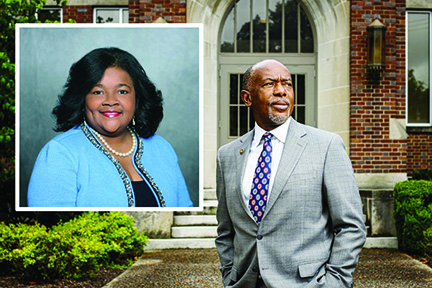By Clint Confehr

By Clint Confehr
NASHVILLE, TN — Physicians and their allies across America are working to improve the health of Black men through better treatment, research and education.
This important work is supported by institutions including Meharry Medical College, the Association of American Medical Colleges, the Black Men’s Health Project, Heal90, and many other medical professionals.
Studies have found Black men’s health care is better when African American doctors treat them, experts told The Tennessee Tribune. With the goal of increasing workforce diversity, the U.S. Department of Health and Human Services formalized a memorandum of understanding (MOU) with Meharry. It’s a significant step, Meharry President Dr. James E.K. Hildreth said.
“Most of the people” making America’s health policy decisions “do not look like us,” Hildreth said during a May 30 signing ceremony on campus.

The MOU is a step toward giving Meharrians an opportunity to affect health policy. Dr. Kevin Billups, director of Meharry’s Men’s Health Program, advocates lifestyle changes over pharmaceutical solutions, noting diet and exercise combat obesity, high blood pressure, bad cholesterol, heart disease and stress.
“Medicines treat symptoms. Lifestyle changes get to the underlying cause. My goal is to get you off medicines, if possible,” Billups said, noting that some blood pressure medicines can contribute to erectile dysfunction (ED) and that obesity, overeating, bad cholesterol, smoking, a lack of sleep and stress may also contribute to hypertension.
“A lot of it is lifestyle,” said Billups, an authority in managing ED and testosterone deficiency. Black men “have the worst health statistics” of any ethnic group, he added.
Substantiating that point is the Black Men’s Health Project. It’s focused on gaining a deeper understanding of the unique health challenges of Black men. The project was created to call attention to the health crisis confronting African American men and works to develop culturally competent strategies and solutions to improve health treatments for them. Led by a coalition of Black male researchers from some of America’s leading institutions, the project reports Black men are 30% more likely to die of heart disease, 60% more likely to die from stroke, 75% less likely to have health insurance, and nine times more likely to die from AIDS.
The project is backed by Meharry as well as George Washington University, Johns Hopkins University and Michigan State University. Researchers from the latter three universities developed the Black Men’s Health Survey to learn how and why certain factors contribute to health disparities.

Meharry graduate Dr. Calvin Smith III, a primary care physician at Meharry Medical Group, agrees with Billups that diabetes and hypertension among Black men are “starkly out of proportion from the rest of the population.
“There’s no solid science on the matter,” Smith said, “but there are so many additional stressors on Black males that they are living with a constant state of hormonal upheaval.”
Racism is “thought to contribute to that,” said Smith, a member of the Davidson County Board of Health which is examining injustices, disparities and violence as health issues. Smith also serves as a consultant with Heal90 Inc., a restorative health company addressing health issues including diabetes, obesity, hypertension, acid reflux, snoring, pain, and cancer.
Another issue is the percentage of Black doctors in America, particularly Black male physicians. According to a 2015 report from the Association of American Medical Colleges, the number of Black male medical students declined from 542 in 1978 to 515 in 2014. Within a decade, AAMC told the U.S. Senate Health Committee, “African American students overall made up only 10% of total matriculants in 2023-24, a slight decrease from 10.2% in 2022-23 but up from 8.4% in 2016-17.” HHS reports 12.1% of Americans in 2021 were Black.

Meharry is focused on long-term solutions, including field trips to the college by working with Haynes and Creswell Middle Schools to plant the idea for students to consider medical careers “if they work hard,” said Majornette Jefferson, director of Meharry’s community outreach, community affairs. This summer’s STEAM (Science, Technology, Engineering, Arts and Math) Summit at Meharry continues through mid-July.
Meanwhile, a mural at 2003 Dr. D.B. Todd, Jr. Blvd. reads, “I’m going to be a doctor” and shows aBlack male who doesn’t want to be an entertainer or athlete, or limited by others’ expectations.
“Reports of our nation’s health care workforce shortage are widespread … the need continues to grow,” Dr. Cherae Farmer-Dixon, dean of Meharry’s School of Dentistry, told a Senate subcommittee on health care last year. “Equally concerning, diversity in our workforce is stagnant, especially within dentistry.”
For more about the Black Men’s Health Survey, visit blackmenshealthproject.org/survey.
Copyright 2024 TNTRIBUNE, All rights reserved.



